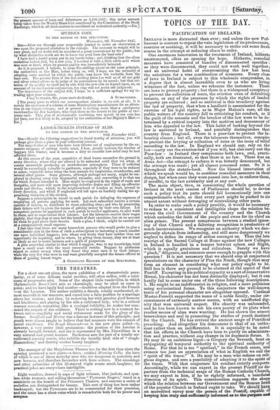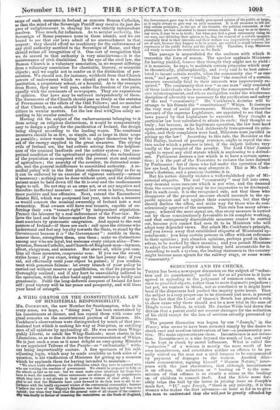TOPICS OF THE DAY.
PACIFICATION OF IRELAND.
IRELAND is more distracted than ever and unless the new Pai- liament is content to repeat the vain legislation of its predecessors, coercive or soothing, it will be necessary to strike out some fresh course in the attempt at reducing chaos to order. , One enormous innovation in the treatment of Ireland, hitherto unattempted, offers an opening for hope. Hitherto, remedial measures have consisted of bundles of disconnected specifics : as they were disconnected, they could not work well together; and an universal habit of compromising the law has been the substitute for a true combination of measures. Every class
of laws in Ireland is subject to this wholesale compromise, in a degree that is almost incredible even to us who are living. witnesses of the fact, unless we rehearse the instances. There are laws to protect property ; but there is a widespread conspiracy to prevent the collection of rents, the eviction even of defaulting- tenants, or any of the processes by which the rights of landed property are enforced ; and so universal is this treachery against the law of property, that when a landlord is assassinated for the exercise of his legal rights, as in Major Mahon's case, all the public writers of the country fall to criticizing his conduct, as if the guilt of the assassin and the breaker of the law were to be de- termined by a critical inquiry into the motives and demeanour of him who appealed to the law. This habit of looking beyond the law is universal in Ireland, and painfully distinguishes that country from England. There is a poor-law to protect the la- bouring classes ; but all, even the labourers themselves, conspire to prevent the levying or collection of rates or the issue of relief according to the law. In England we should say, rely on the law—carry out the eviction-law if you will, but also carry out the Poor-law : in Ireland they compromise both laws' and, practi- cally, both are frustrated, so that there is no law. There was an Arms Act—the attempt to enforce it was bitterly denounced, but the attempt was made • yet all classes possessed arms. So it is throughout the statute-book. Now the blessed innovation of which we speak would be, to combine remedial measures in their design, but when ()ace they were passed into law, to enforce them, if needful, to the last extremity and at any cost.
The main object, then, in considering the whole question of Ireland in the next session of Parliament should be, to devise such a policy that its parts should fall harmoniously into one comprehensive whole, so that every part might be pushed to its utmost extent without deranging or neutralizing other parts.
Iu order to make such a policy possible, it would be necessary to reduce to a consistent and intelligible shape the relation be- tween the civil Government of the country and the Church which embodies the faith of the people and owns for its chief an alien prince. The present compromise between a studied ignor- ing of that Church and a faltering recognition, is productive of much inconvenience. We recognize an authority which we dan- gerously abstain from influencing, and still more dangerously we neglect to define its range of action amongst us. Thus the late rescript of the Sacred College at Rome against the new Colleges in Ireland is handled in a temper betwixt spleen and fright, which is equally gratuitous and ridiculous. Surely we have "pluck," diligence, and common sense enough to grapple with this question ? It is not necessary that we should stop at conjectural speculations on the character of Pius the Ninth, though that may form an element in considering what our policy ought to be. Still less is there any ground to be alarmed at the aspect of that Pontiff. Excepting in his political capacity as a sort of conservative Rienzi, his character has not been distinctly displayed; but it can hardly fail to come under one of the three following descriptions. 1. He might be an indifferentist in religion, and a mere politician using ecclesiastical forms. To this conjecture the well-known traits of his personal character are altogether opposed. Cardinal Mastai-Ferretti supported the name of a noble family, under cir- cumstances of extremely narrow means, with an unaffected dig- nity that won universal respect. His charity was unbounded, and he has been known to rob his own pantry of its plate when readier means of alms were wanting. He has shown the utmost benevolence and zeal in promoting the studies of youth destined for the Church. He has revived the ancient usage of Pontifical preaching. And altogether his demeanour is that of an enthu- siast rather than an indifferentist. It is especially to be noted that his efforts in the Church have been to purify its administra- tion and practice, without any change in its dogmatic forms. 2. He may be an ambitious bigot—a Gregory the Seventh, bent on subjugating all temporal authority to the spiritual authority of Rome. For that he is too "spirituel," in the French sense, and evinces too .just an appreciation of what in English we call the "spirit of the times." 3. He may be a man who refines on reli- gious dogma, and sees a possibility of adapting it to the spirit of the times. With that conjecture his conduct strictly comports. Accordingly, while we can expect in the present Pontiff no de- parture from the technical usage of the Roman Catholic Church, we may expect in him, if he be rightly informed, a beneficial direction of its spirit. This consideration suggests the shape which the relation between our Government and the Roman head of the popular Church in Ireland ought to take. We should have an accredited envoy near the person of the Pontiff, capable of keeping him truly and.sufficiently informed as to the purpose and scope of such measures in Irelaud as concern Roman Catholics, so that the mind of the Sovereie Pontiff may receive its just de- gree of enlightenment in shaping his own strictly independent resolves. Thus mucb-fer. influence. As to secular authority, the Sovereign of Acme possesses none in these islands, and we are bound to see that our laws. admit of no encroachment in that respect: they should afford'no machinery for the enforcement of tiny civil authority ascribed to the Sovereign of Rome, and they should refuse all recognition of it. One sort of recognition that we do accord to that authority is very mischievous—it is the maintenance of civil disabilities. In the eye of the civil law, the Roman Church is a voluntary association, in no respect differing from a voluntary association for charitable, literary, or scientific objects ; and we ought not to confer on it the distinction of per- secution. We should not, for instance, withhold from that Church powers of endowment which we should grant to a mechanics institution, a proprietary school, or a hospital. As to the rescripts from Rome, they may well pass, under the freedom of the press, equally with the comments of newspapers. They are expressions 61 opinion. Our laws may be enforced independently of them. The documents of the Church should pass as freely as the statutes of Freemasons or the edicts of the Odd Fellows and no member of that Church, as such, should be distinguished from any other citizen in secular matters. Let the law deal with:him solely ac- cording to his secular conduct. Having rid the subject of the embarrassment belonging to it from acting on religious distinctions, it would be comparatively easy to design a policy for the pacification of Ireland, the design being sliaped according to the leading wants. The combined measures should be as few, as simple, and as large in their scope as polagbla ; minor wants being left to adjust themselves by the aid. of the energy supplied- in the great measures. The crying evils of Ireland are, the bad culture arising from the helpless- ness of the nominal landlords and the cottier system ; the pau- perized' condition of the agricultural population; • the redundancy of the population as compared with the present state and extent of agriculture; the anarchy of the country, its distracted coun- cils, and the general indifference to constituted authority. A re- medial policy will in the first place enforce tranquillity so far as it can be enforced by. an exercise of vigorous authority—armed if necessary :.nothing can be done without quiet, and the delirious patient must be held down till the fit is over and the medicaments begin to tell. Do not stop at an arms act, or at any negative and therefore ineffectual measure : martial law even is better, because more positive and less offensive. Next, extend the Encumbered Estates Bill, which was postponed last year, into such a measure as would convert the nominal ownership of Ireland inth a real ownership. Real owners will have real tenants, capable of en- forcinga their own " tenant-right " by independent stipulation. Protect the labourer by a real enforcement of the Poor-law. Re- lieve the land and the labour-market from the burden of redun- dant numbers by systematic emigration. And appeal to the real patriots of Ireland—if there are such : call upon the citizens who understand and feel any loyalty towards the State, to stand by the Government because it is "the Government " : confide in them, honour them, strengthen them, arm them ; make no distinctions among any who are loyal, but welcome every citizen alike—Pres- byterian, Roman Catholic, and Church-of-England- man—layman, priest, clergyman, and minister.But above all, while you com- bine all these measures, compromise none. If you use the sword, Rtrike home ; if you exact, wring out the last penny due; if you aid, aid effectually until your object be gained ; if you confide, trust with generous fulness: let every branch of your policy be carried out without reserve or qualification, so that its purpose be thoroughly realized ; and if any hurt be unavoidably inflicted in the operation, with the other hand apply restoratives as boldly and generously. Fulfil the long-deferred conquest of Ireland for her- self: your victory will be her peace and prosperity, and will bless your hand of strength.



























 Previous page
Previous page